Poorer and non-German speaking families less likely to find a kita place

A recent study by the Federal Institute for Population Research (BiB) finds certain groups are still disadvantaged in the search for childcare spots in Germany—even though parents are supposed to be legally guaranteed one.
Ten years after Germany introduced guaranteed childcare - or kita - spots for all children from the age of one, privileged families are still more likely to find one in practice, a new study has found.
The BiB study looked at data from 96,000 children aged three and younger across Germany.
Both poorer families and those who do not speak German at home continue to struggle to find spots. In 2020, 35 percent of young children in Germany had a place at kita. That compared to only 24 percent of children whose families didn't speak German at home and 23 percent of children from poor families.
14 percent of families simply couldn't find a place, despite wanting one and being legally guaranteed one. For poorer families, this rose to 17 percent and for families that didn't speak German at home, this figure was noticeably higher - 28 percent who wanted a place couldn't find one. It is possible to sue for a place, but privileged families are more likely to be able to do this.
READ ALSO: Germany to be short 384,000 Kita places ‘by 2023’
The BiB is calling for the federal government to make more kita places available, particularly for children who do not speak German at home. Otherwise, this would risk children from migration backgrounds missing out on developing their educational potential in early childhood and having to make up for it later, the Institute said.
“This is despite the fact that parents with a migration background, for example, often want their kids to go to daycare,” says BiB Director Katharina Spiess, asking the government to make this a priority discussion during its education summit on the 14th and 15th of March.
BiB is also calling for more active assistance to certain families as they search for places.
Comments
See Also
Ten years after Germany introduced guaranteed childcare - or kita - spots for all children from the age of one, privileged families are still more likely to find one in practice, a new study has found.
The BiB study looked at data from 96,000 children aged three and younger across Germany.
Both poorer families and those who do not speak German at home continue to struggle to find spots. In 2020, 35 percent of young children in Germany had a place at kita. That compared to only 24 percent of children whose families didn't speak German at home and 23 percent of children from poor families.
14 percent of families simply couldn't find a place, despite wanting one and being legally guaranteed one. For poorer families, this rose to 17 percent and for families that didn't speak German at home, this figure was noticeably higher - 28 percent who wanted a place couldn't find one. It is possible to sue for a place, but privileged families are more likely to be able to do this.
READ ALSO: Germany to be short 384,000 Kita places ‘by 2023’
The BiB is calling for the federal government to make more kita places available, particularly for children who do not speak German at home. Otherwise, this would risk children from migration backgrounds missing out on developing their educational potential in early childhood and having to make up for it later, the Institute said.
“This is despite the fact that parents with a migration background, for example, often want their kids to go to daycare,” says BiB Director Katharina Spiess, asking the government to make this a priority discussion during its education summit on the 14th and 15th of March.
BiB is also calling for more active assistance to certain families as they search for places.
Join the conversation in our comments section below. Share your own views and experience and if you have a question or suggestion for our journalists then email us at [email protected].
Please keep comments civil, constructive and on topic – and make sure to read our terms of use before getting involved.
Please log in here to leave a comment.